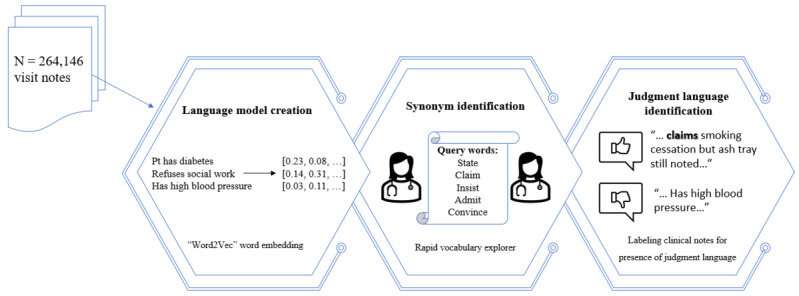This article has been reviewed according to Science X's editorial process and policies. Editors have highlighted the following attributes while ensuring the content's credibility:
fact-checked
peer-reviewed publication
trusted source
proofread
Home health is another care setting where workers use judgment language: Study

Language matters, especially in health care. Clinicians rely on patient characteristics to construct a compelling and accurate picture, such as the age, sex, or symptoms in a 25-year-old woman with lower abdominal pain.
But derogatory expressions are also sometimes used to describe patients. Terms like "poor historian," "noncompliant," or "no-show" routinely appear in clinical medicine, reflecting and reinforcing negative stereotypes.
Recent research found that stigmatizing language is surprisingly common, across a wide swath of clinical settings, including outpatient clinics, emergency rooms, and inpatient hospital stays. The question is, how common is stigmatizing language in home health care, one of the fastest-growing outpatient settings? And how does it affect patient care?
In a new Journal of Medical Internet Research (JMIR) nursing study, LDI Senior Fellow Kathryn Bowles and colleagues, including PI Maxim Topaz, a Penn Nursing Ph.D. graduate, used machine learning to detect patterns in "judgment language," one metric of stigmatizing words, in the notes of urban home health care clinicians. Drawing from data collected by a private company, the authors analyzed clinicians' perceptions of a patient's reliability (e.g., the patient "states," "claims," "admits").
As Bowles and colleagues noted, it was the first study of its kind to examine "the extent of stigmatizing language in home health care," a rapidly growing site of care for more than 5 million Americans annually.
In a cohort of 45,384 patients, researchers examined over 260,000 patient notes. Applying their algorithm, Bowles and colleagues found that 10% of all notes included judgment language. More specifically, this language was most common among Hispanic and Black patients, followed by white and then Asian patients. In fact, Black and Hispanic patients were 14% more likely to have judgment language present in their notes than white patients.
Crucially, the authors observed that the "length of a home health care visit was reduced by 21 minutes when judgment language was used."
"This is concerning," the authors wrote, "since shorter home health care visits are associated with a higher risk for poor outcomes," such as a higher risk of hospitalizations.
Recent scholarship found that negative language was often correlated with a patient's race and ethnicity. Substantive evidence demonstrated that Black patients were 25-50% more likely to have stigmatizing language used than white patients in electronic health records across many settings.
Similar stigmatizing words were also found to be commonly associated with patients with substance use disorders and chronic conditions, such as diabetes.
Some researchers have started exploring links between stigmatizing language and quality of care. For instance, one study found that increased clinician exposure to such language was correlated with less aggressive pain management for patients.
Bowles' study illustrates the pervasiveness of implicit racial biases among health care workers, and their tangible impact on clinical practice. Ultimately, the authors recommended four policy solutions that could lessen clinician bias.
- Design more inclusive and neutral clinical documentation guidelines. In particular, eliminating or justifying the use of certain words or expressions of judgment in patient notes.
- Targeted training for clinicians who frequently use stigmatizing language in their clinical encounter notes.
- Provide counseling and educational interventions for clinicians to decrease the overall use of stigmatizing language.
- Train clinicians to spend more productive time with patients who are not following instructions or refuse self-management.
Language truly does matter for patient care.
More information: Maxim Topaz et al, Home Health Care Clinicians' Use of Judgment Language for Black and Hispanic Patients: Natural Language Processing Study, JMIR Nursing (2023). DOI: 10.2196/42552





















